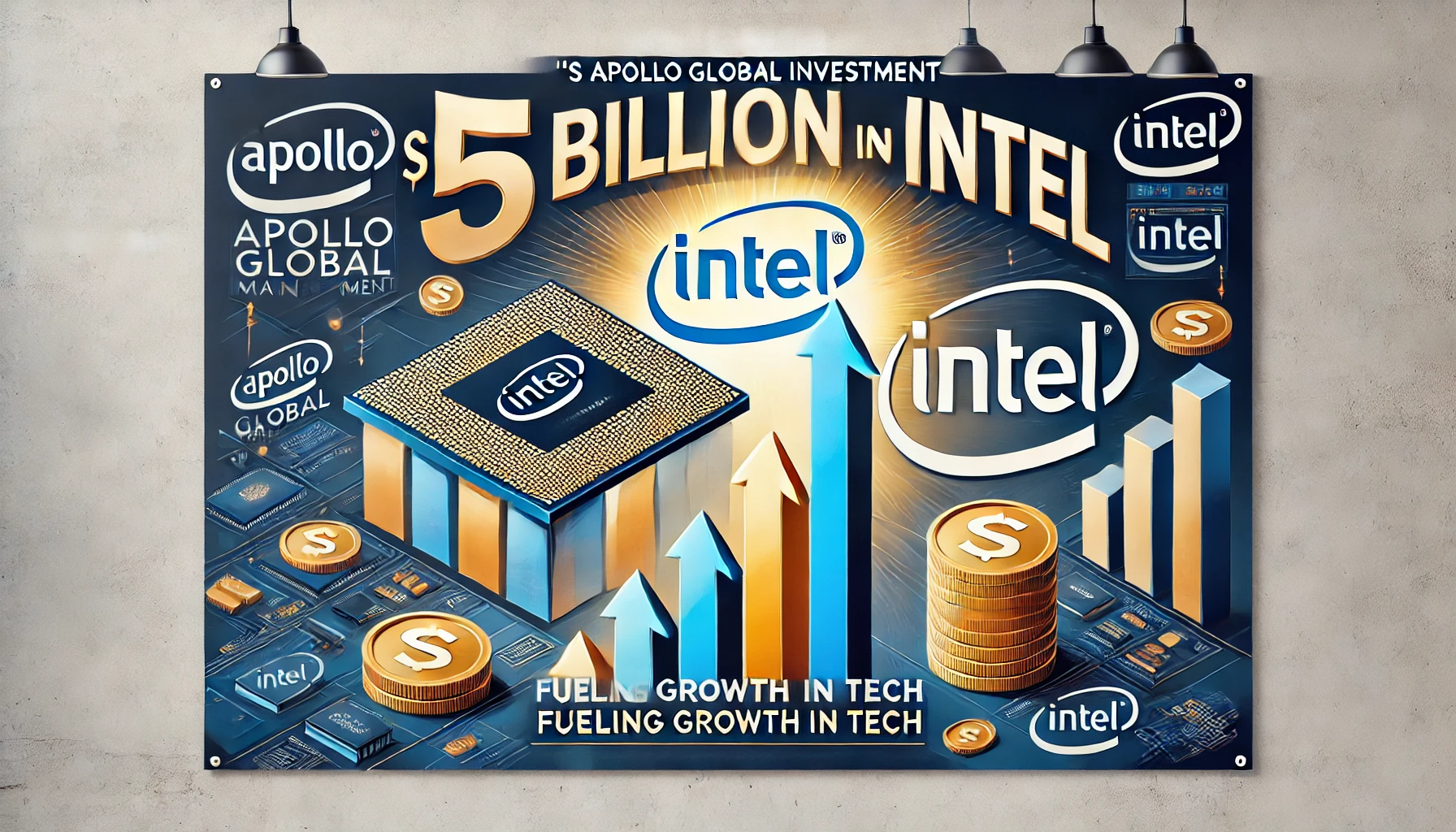Apollo Eyes $5 Billion Investment in Intel: What It Means for the Tech and Investment Sectors
The news that Apollo Global Management is reportedly considering a $5 billion investment in Intel has sparked significant interest across both the tech and investment worlds. According to a Bloomberg report, the deal could have far-reaching implications, especially given Intel’s position as a leading player in the semiconductor industry. This move highlights the increasing appetite for private equity firms to invest in the tech sector, particularly in companies with a strong foothold in critical technologies.
In this blog, we’ll explore the significance of this potential Apollo Intel partnership, what it means for Intel’s stock and corporate investments, and how it might reshape the semiconductor industry moving forward.
The Apollo Intel Partnership: A $5 Billion Bet on Tech
Apollo Global Management, one of the largest private equity firms in the world, has a long history of making bold investments across various sectors. Now, it appears that the firm has its sights set on Intel, with a reported $5 billion investment aimed at supporting Intel’s growth and innovation in the semiconductor space. This potential deal would be one of Apollo’s most significant ventures into the tech world, and it aligns with the firm’s strategy of backing companies that are poised for growth.
Why Apollo Is Investing in Intel
There are several reasons why Apollo investment is interested in Intel:
- Semiconductor Dominance: Intel is a key player in the global semiconductor market, a sector that has seen exponential growth due to increased demand for chips in everything from smartphones to electric vehicles.
- Intel’s Corporate Investment Strategy: Intel has been making significant corporate investments in new technologies and manufacturing capacity, positioning itself for long-term success despite recent challenges.
- Private Equity’s Growing Interest in Tech: Firms like Apollo Global Management are increasingly eyeing opportunities in tech due to its high-growth potential, and Intel offers a unique opportunity to tap into a company with a strong foundation in a critical industry(
).
The potential Apollo Intel partnership is also seen as a vote of confidence in Intel’s strategic direction, particularly as the company navigates competitive pressures from rivals like AMD and Nvidia.
Intel’s Investment Strategy: Capital for Growth and Innovation
Intel’s investment news has been buzzing for years, particularly as the company continues to make strategic moves in areas like manufacturing, research and development, and acquisitions. The reported $5 billion investment from Apollo could accelerate these efforts, giving Intel the capital it needs to solidify its leadership in the semiconductor industry.
Intel Stock Investment and Corporate Growth
Intel’s stock performance has been mixed in recent years, largely due to competition in the semiconductor market. However, the company’s focus on corporate investment has provided a foundation for future growth:
- Chip Manufacturing: Intel has made significant investments in expanding its chip production capacity, including the development of new fabrication plants in the U.S. and abroad.
- R&D Investments: Intel’s commitment to research and development ensures that it stays at the forefront of semiconductor innovation, with billions allocated annually to cutting-edge technologies(
).
This focus on Intel stock investment and corporate growth makes the company an attractive target for private equity investment, and Apollo’s investment could further bolster Intel’s financial resources for future expansion.
Intel Semiconductor Investment: Shaping the Future of Tech
At the heart of Intel’s growth strategy is its leadership in the semiconductor industry. The company’s semiconductor investment plays a critical role in meeting global demand for advanced chips, which are essential for a wide range of industries, including automotive, healthcare, and consumer electronics. As Intel ramps up its semiconductor investment, the potential Apollo Intel partnership becomes even more relevant.
Intel’s Role in the Semiconductor Industry
Intel’s semiconductor investment focuses on several key areas:
- Advanced Chip Technologies: Intel continues to innovate in chip design, producing more powerful and energy-efficient processors.
- Supply Chain Resilience: As the global semiconductor shortage continues, Intel is investing in infrastructure to ensure more robust supply chains.
- Strategic Partnerships: Intel has partnered with several leading companies in the tech and automotive industries, leveraging its semiconductor expertise to drive growth(
).
The $5 billion Apollo investment could provide Intel with the necessary capital to strengthen its position in the semiconductor market, ensuring that it remains competitive as demand for advanced chips skyrockets.
Bloomberg Intel Investment Report: Insights into the Deal
The Bloomberg Intel investment report has shed light on some of the potential details of the Apollo deal. According to sources, the investment would be structured as a combination of equity and debt, giving Apollo a significant stake in Intel without diluting the company’s existing shareholders. This approach is common in large private equity transactions, allowing firms like Apollo to gain influence over strategic decisions while minimizing risk.
Why Bloomberg’s Report Matters
The Bloomberg report highlights several reasons why this potential investment is significant:
- Confidence in Intel’s Future: The fact that Apollo is willing to invest $5 billion signals confidence in Intel’s ability to navigate its challenges and capitalize on opportunities in the semiconductor space.
- Implications for the Tech Industry: This deal could set the stage for more private equity investments in the tech sector, particularly as companies like Intel seek to scale their operations and invest in new technologies.
- Broader Market Impact: News of such a large investment can influence Intel’s stock price and affect investor sentiment in the broader semiconductor industry(
).
This report reinforces the growing interest in tech investments, particularly in companies with the potential to lead in critical industries like semiconductors.
The Bigger Picture: Apollo and Intel’s Strategic Moves
Beyond the immediate impact of the $5 billion investment, the potential Apollo Intel partnership could have broader implications for both companies. For Intel, the investment would provide much-needed capital to fuel its ambitions in the semiconductor market. For Apollo, the deal represents an opportunity to gain a foothold in one of the most important industries of the 21st century.
Potential Benefits for Intel
- Increased Capital for Expansion: With Apollo’s backing, Intel could accelerate its expansion plans, particularly in areas like chip manufacturing and R&D.
- Stronger Competitive Position: Intel would be better positioned to compete with rivals like AMD and Nvidia, which have been gaining market share in recent years(
).
Potential Benefits for Apollo
- Exposure to High-Growth Industries: By investing in Intel, Apollo gains exposure to the semiconductor industry, which is expected to grow rapidly in the coming years.
- Strategic Influence: As a major investor, Apollo would likely have influence over Intel’s strategic decisions, allowing the private equity firm to help shape the future of the tech giant.
Apollo’s $5 Billion Investment in Intel Signals Confidence in the Future
The potential Apollo investment in Intel represents a significant development for both companies and the broader tech industry. As Intel continues to invest in semiconductors and critical technologies, the reported $5 billion investment from Apollo Global Management could provide the capital needed to drive growth and innovation. Whether you’re an investor in Intel stock or simply interested in the future of technology, this partnership is one to watch.
As we move forward, it’s clear that both Intel and Apollo see the value in this collaboration, with each company positioned to benefit from the strategic synergies created by the deal. For more insights into investments in the tech sector, visit Regent Studies for in-depth resources.
For more updates on this developing story, check out Bloomberg’s report on Apollo’s investment in Intel.



